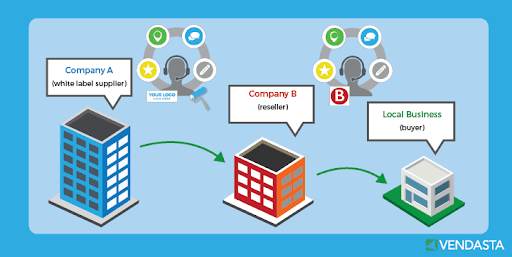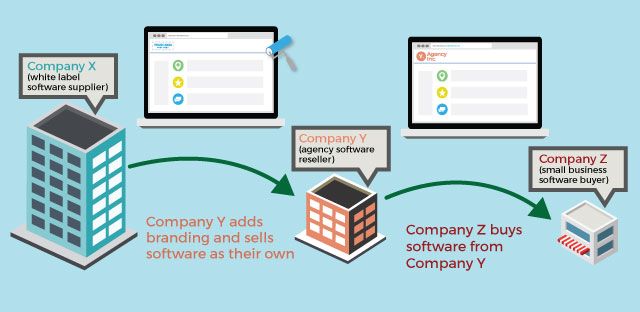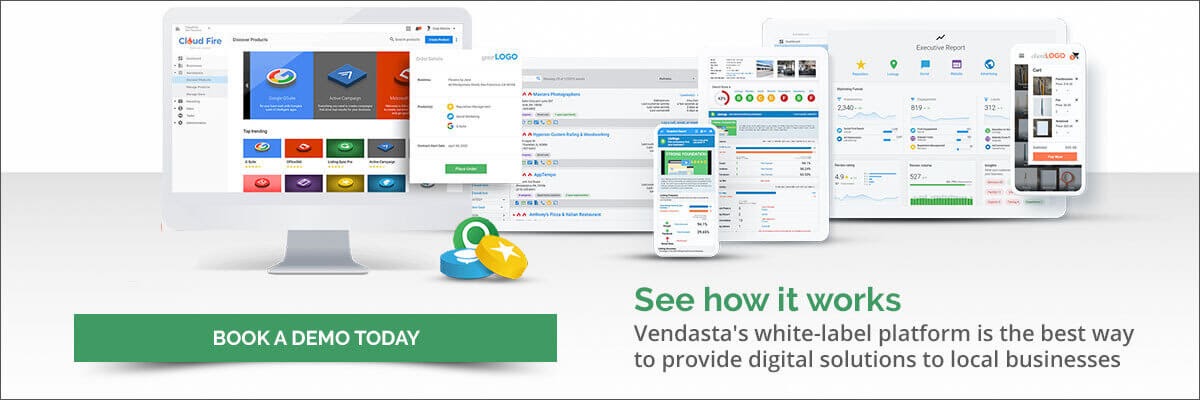Decoding white-label products: The ultimate guide to building a brand, and sales tips for success
 By Vishal Teckchandani
By Vishal Teckchandani You’ve likely come across the concept of white label and white-label products, but what exactly does it mean to you as an agency or digital marketing service provider?
To understand its meaning and benefits, let's zero in on a shared challenge among digital marketing sellers: delivering products and services to clients with somebody else's brand prominently featured during the process or within the end outcome.
For instance, when partnering with a website provider, your arrangement with that supplier may involve having their logo or name embedded on the websites they create even though you’re delivering it to a client. As the agency or provider of the service, it's undesirable for visitors to clearly see who was effectively subcontracted to build the website.
Similarly, managing a client's social media using a third-party solution often means that their brand is unmistakably visible if the client also has shared access to that same technology.
This raises a critical question for small and medium businesses (SMBs): "Why involve an intermediary when I can directly engage with the product provider?" It's a significant business risk, and this is precisely where white-label shines.
What is white labeling?
The notion of white label or white-labeling involves offering products and services created by one company for sale under your brand name. In the marketing landscape, strategically leveraging white-label products and services addresses concerns associated with the conspicuous presence of a third-party brand.
Alt text/caption: A general depiction of the white-label process.
As the old saying goes: “Perception is everything”, and nowhere is this truer than in business. That’s why utilizing white label allows you to keep the focus on your brand, reinforcing the perception that most of your client deliverables come directly from your company, rather than giving the impression of acting as a mere intermediary.
What is private labeling?
In private labeling, a company has hired another to manufacture products under its brand, or one of its brands, and maintains significant control over the entire process.
White label and private label are related concepts in product branding, but they have distinct characteristics and are summarized in the table below.
| Aspect | White label | Private label |
| Ownership | The product or service is produced by one company and sold by another under its own brand. | Private label involves products and not services. The product is produced by one company and sold under the brand, or one of the brands, of another company. |
| Brand visibility | The brand of the company producing the product or service is not visible to the end consumer. | The brand of the company producing the product is not visible; it is sold under a brand chosen by the purchaser of private-label products. |
| Customization | Limited customization options; the reselling company can typically add its branding. | Greater customization options; the purchaser can often choose or influence product features. |
| Control over pricing | The reselling company typically purchases the product or service at wholesale prices and then sets its markups. | The reselling company typically purchases the product at wholesale prices and then sets its own markups. |
What is an example of a white-label product?
Consider a company that produces software solutions that can be resold under an agency’s brand, and used or accessed by the end customer, being SMBs. SMBs interact with the software without knowing the original software provider, making it a white-label product.
Vendasta is one example of a company that offers white-label software. A visual representation of the process of how products and services are distributed under a white-label arrangement is provided below.
Alt text/caption: A depiction of how white-label products and services are distributed by marketing services providers.
What is an example of a private-label product?
Private-label products primarily belong to the realm of consumer goods and brands. Imagine a supermarket chain engaging a food manufacturer to craft a range of snacks exclusively marketed under its own brand. Given the scale of these agreements, the supermarket exercises substantial control over various elements, including product attributes, branding, and pricing.
These snacks remain exclusive to that specific supermarket and aren't accessible through other retailers. Notable instances of private labels in this category encompass Costco's Kirkland and Walmart's Great Value brands.
How does white labeling work?
Understanding the dynamics of white-label and private-label concepts prompts the question: Why would a company choose to create a product that can be rebranded instead of selling it directly to consumers? The rationale behind this lies in the symbiotic relationship between product creators and sellers, each with distinct specialties.
For instance, consider a software company equipped with the expertise to develop software. It invests significantly in building, marketing, and selling software to intermediaries, such as marketing agencies, who excel in comprehending the specific needs of SMBs.
Conversely, retail giants like Costco or Walmart prefer not to delve into the complex and costly process of establishing factories to manufacture their products. Instead, they collaborate with established producers through private-label contracts, allowing them to sell products under their exclusive brands without the burden of in-house production.
Pros of selling white-label products and services
Alt text/caption: A visual representation of the general benefit of white-label.
Embracing the strategy of selling white-label products brings forth many advantages for marketing agencies and service providers seeking to elevate their service offerings. Here's a look at the benefits:
Brand consistency
White-label products empower agencies and other providers to maintain a consistent and professional brand image across various services. By embedding their branding on products, digital marketing companies ensure a seamless experience for clients, reinforcing their unique identity and the value they’re bringing to the table, both in terms of services and technology.
Competitive edge
Digital marketing services providers can maintain a leading position in the ever-evolving industry landscape by integrating white-label products. Adapting and embracing emerging technologies offers a distinct competitive advantage over competitors slower to adopt innovations.
Moreover, presenting white-label solutions positions your company as an invaluable partner equipped with the technological prowess to address all aspects of an SMB’s challenges, offering transparent access to comprehensive marketing results. This not only enhances your value proposition but also reinforces your credibility as a reliable and forward-thinking partner for SMBs.
Your company’s value increases
Marketing services providers that strategically employ an efficient and robust technology stack, coupled with the incorporation of white-label products and services within a recurring revenue business model, stand poised to attain a significantly higher business valuation. This insight is underscored by David Tobin, Managing Partner at TobinLeff, a recognized authority in mergers and acquisitions of marketing companies.
The reasoning behind this valuation boost lies in the provider’s ability to demonstrate operational excellence, forward-thinking adaptability and a commitment to innovation that lowers the overall cost of doing business while driving profitability.
Watch our Scaleblazers Session with Tobin below to gain insights into optimizing your business value.
| CTA: David Tobin webinar link tbc |
Time and cost efficiency
Leveraging pre-existing white-label solutions eliminates the need for agencies and other boutique marketing specialists to create their own, which is typically unaffordable for all but the biggest agencies. No need to invest time and money in software development or hire huge teams of writers, search engine optimization (SEO) specialists, and graphic designers to fulfill work for clients.
Focus on core competencies
Agencies and marketing services providers can channel their energy and resources into areas where they excel, such as client relations, strategy, marketing, and sales. White-label partnerships enable them to leave the technical intricacies and fulfillment to specialized providers who work behind the scenes.
Scalability and flexibility
White-label products offer scalability without the need for proportional increases in internal resources. Marketing services providers can adapt their service offerings to evolving client demands effortlessly. The flexibility of white-label solutions allows marketing companies to diversify their service portfolio rapidly. They can expand their offerings without the challenges associated with developing entirely new products.
Risk mitigation
Developing proprietary solutions carries inherent risks. White-label products mitigate these risks by offering proven, ready-to-deploy solutions, minimizing the uncertainties associated with custom development.
Revenue expansion
By selling white-label products, agencies, and other service providers can go to market quicker and diversify their revenue streams at a faster rate than traditional service propositions, which typically entail the sale of point solutions.
Client transparency and other features
Some white-label software providers offer client-facing portals and sales intelligence tools within their technology stack. This unique feature allows digital marketers not only to select resellable products and services but also to use the software for prospecting and selling those services. Additionally, service providers can provide SMBs with a dedicated client-facing login. This empowers clients to access and observe the results generated from their marketing investment, fostering increased trust and transparency in their relationship with the resellers, all while keeping the focus on your brand.
Cons of selling white-label products and services
While white-label products offer numerous advantages, there are considerations that users of these solutions should consider.
White labeling involves a learning curve
Navigating the learning curve of white-label software can be a significant aspect of its adoption. Investing time in learning how to use these solutions is essential. A thorough understanding of the white-label offerings from your service provider empowers your company to seamlessly integrate their technology and offerings into your strategy. This not only enhances your internal operations but also enables you to articulate the cohesive nexus of products and services delivered to clients.
Dependency on third-party providers
Relying on white-label products and services means being dependent on external providers rather than your in-house team.
From a software perspective, a major feature change or service disruption can impact an agency or marketing company’s ability to deliver services to SMBs seamlessly. On the service front, potential challenges may arise in terms of consistency and quality when outsourcing to a white-label service provider, often operating with extensive teams.
Limited customization and control
White-label products typically come with predefined features, limiting those utilizing white-label products and services in tailoring solutions to meet unique client requirements. The lack of customization may hinder digital marketing service providers from addressing client needs that are highly targeted.
Profitability dynamics
While white-labeling can indeed be highly profitable, unlocking the potential to resell products and services at scale and explore new revenue streams, the intricacy lies in the revenue model. Agencies and other service providers typically purchase these products and services from software companies at wholesale prices and then retail them to clients.
While this model facilitates revenue generation, it introduces a limitation—the profit margin may not reach its zenith compared to directly creating and selling the software to the end customer. At the same time, this approach also prevents risks for agencies and other small marketing service providers from needing to invest in the arduously expensive and time-consuming task of building software and employing large fulfillment teams.
7 white-label products and services you should sell
With a clear understanding of the reasoning behind white-label, let's explore the diverse array of products and services agencies and other providers, be they managed service providers (MSP), publishers, and IT companies, can resell under their brand. The possibilities are expansive, but here's a glimpse of seven popular offerings to augment your portfolio and context around how they work in a white-label context.
1. White-label reputation management
Reputation management involves monitoring, influencing, and managing how a business is perceived online. Through white-label reputation management, your company empowers clients to maintain a positive digital image. Utilizing a rebranded tool, clients can track online reviews, respond to customer feedback, and enhance their overall online reputation seamlessly.
- Client benefit: Clients benefit from an enhanced online image, improved customer trust, and increased positive interactions, translating to a better brand perception.
- Business benefit: You get to fortify client relationships and demonstrate a dedicated approach to brand management that builds trust and loyalty. Reputation Management opens dual revenue streams. Firstly, by reselling white-label products, empowering SMBs to oversee their online reputation. Secondly, by actively engaging in responding to reviews on behalf of the client, enhancing their online image.
2. White-label listings management
Listings management ensures the accuracy and consistency of a business's information across online directories. White-label listings management equips clients with a tool, adorned with your brand, to optimize local search presence. This involves managing business listings, citations, and contact information for enhanced visibility.
- Client benefit: Clients experience improved local search visibility, increased accuracy in online information, and enhanced discoverability by potential customers.
- Business benefit: This crucial service significantly influences clients' online visibility and solidifies your position as a holistic solution provider. Listings Management, facilitated by specific white-label software, streamlines SMBs' business details across various listings effortlessly, offering a low-touch yet continuous revenue stream for resellers.
3. White-label social media marketing
Social media marketing is the strategic use of social platforms to connect with audiences, build brand awareness, and drive engagement. Through white-label social marketing, your company resells rebrandable social media marketing software to engage and grow its audiences.
- Client benefit: Clients enjoy increased social media presence, higher engagement, and streamlined content management, leading to improved brand visibility and customer interaction. In the context of white-label, clients can easily self-manage their social media with the white-labeled technology supplied by the intermediary and view performance metrics.
- Business benefit: Agencies and service providers expand their offerings, strengthen client engagement, and position themselves as social media experts, enhancing their overall service portfolio. Best of all? White-label software ensures you don’t need to store sensitive login details for different clients across a plethora of Excel sheets as this type of software is designed to provide seamless access to all of a client’s social media accounts under one login. Like Reputation Management, marketing services providers can generate recurring revenue from simply reselling the software, and then additional income from the fulfillment work of creating content.
4. White-label digital advertising
Digital advertising revolves around creating and executing online ad campaigns to reach a target audience. White-label digital advertising services extend to providing clients with search engine marketing (SEM) and social advertising campaigns. Executed digital advertising under your brand ensures effective and targeted digital promotion.
- Client benefit: Clients experience targeted advertising, increased online visibility, and enhanced brand promotion, leading to improved customer acquisition and brand recognition.
- Business benefit: Service providers demonstrate expertise in digital advertising, broaden their service scope, and contribute to clients' marketing success, reinforcing their position as a comprehensive marketing partner.
5. White-label website design
Website design entails creating visually appealing, functional, and user-friendly websites. White-label website design services offer clients a rebranded, user-friendly website creation platform or service. This facilitates the expansion of their online reach effortlessly under your brand.
- Client benefit: Clients receive a professionally designed website, improved user experience, and an expanded online presence, leading to increased customer engagement and trust.
- Business benefit: Websites are the cornerstone of a client's online presence. Providing this foundational service is essential for the client's and you's long-term success as a marketing services provider. It also opens the gateway for you to offer supplementary products to boost website traffic, expanding their revenue streams.
6. White-label SEO services
SEO involves optimizing online content to improve visibility on search engines. White-label SEO services, branded under your company’s name, provide clients with effective tools or services. This enhances their online visibility, attracting more organic traffic to their digital presence.
- Client benefit: Clients benefit from increased online visibility, higher search engine rankings, and improved website traffic, resulting in enhanced brand recognition and customer acquisition.
- Business benefit: Marketing services companies can establish themselves as SEO authorities, playing a pivotal role in clients' digital triumph. Providing SEO services under a white-label arrangement enables you to efficiently manage and deliver the service, while an external provider handles the execution. This approach proves cost-effective for marketing services providers while allowing them to their service offerings and increase share-of-wallet.
7. White-label content and design
Content and design services encompass the creation of compelling written copy, creative designs, and other visual elements. White-label content and design services elevate the quality of your company’s offerings. Clients receive top-notch content and design services packaged seamlessly under your brand.
- Client benefit: Clients receive high-quality content and design services, ensuring a cohesive brand image, improved communication, and increased customer engagement.
- Business benefit: Content and design represent intricate tasks, demanding diverse skills from writers, designers, and marketing specialists to craft tailored content for varied industries and client scenarios. Harnessing the white-label services of a reliable provider empowers you to take charge of the process, supervise the work, and furnish the final result to clients, all without the need to hire specialized talent in-house.
How to sell white-label products with these sales strategies
Selling white-label products can be a lucrative venture, but the key to success lies in effectively managing your pricing strategy. Here are essential tips and strategies to ensure profitability and build a sustainable white-label business:
1. Strategic pricing control:
- Purchase at wholesale prices: Partner with white-labeling companies that offer products at wholesale prices. This ensures a competitive edge in pricing and maximizes your profit margins.
- No volume requirements: Choose white-label providers that don't impose volume requirements. This flexibility allows you to scale your business at your own pace without unnecessary constraints.
- Pay for what you sell: Opt for a pricing model where you only pay for the products you sell. This reduces financial risk and allows you to manage your inventory more efficiently.
- Freedom in pricing: Ensure that you have the freedom to control the pricing of your white-label products. This flexibility is crucial for adapting to market conditions and optimizing your profit margins.
2. Strategic product packaging:
- Bundle products and services: Reduce decision fatigue for clients by bundling white-label products and services into different packages. Offering comprehensive packages caters to varying client budgets and encourages client buy-in.
- "Land and expand" approach: Initiate with basic packages to secure client commitment, and then scale up the packages and pricing as clients grow. This gradual approach maximizes client retention and revenue.
3. Service Level Expansion:
- Offer service tiers: Diversify your service offerings by introducing service level tiers. From DIY solutions to do-it-for-me (DIFM) packages and do-it-with-me (DIWM), offering a spectrum of choices accommodates diverse client needs and budgets. This approach makes it easier for clients to engage with your company based on their specific circumstances.
- Increase white-label pricing with service levels: Leverage service level tiers to increase your white-label pricing. Fully managed services (DIFM) should come at a premium, reflecting the additional value and effort put forth by your company.
- Understand margins from service versus revenue: Recognize the difference between margins from service and revenue. While high margins are desirable, consider the revenue potential. Value-added services at a lower margin can often result in higher overall profitability.
4. Upselling and cross-selling:
- Maximize lifetime value: White labeling products become more profitable when coupled with value-added services. Explore opportunities to upsell and cross-sell additional services as clients grow. This maximizes the lifetime value of each client.
- Identify growth opportunities: Keep an eye on opportunities to scale up services or introduce new products as your clients' needs evolve. Proactive upselling contributes to both client satisfaction and increased revenue.
5. Explore Service Levels:
- DIY, DIWM, and DIFM models: Understand the three common service tiers – Do-it-yourself (DIY), Do-it-with-me (DIWM), and Do-it-for-me (DIFM). Tailor your offerings to align with these models, providing clients with the level of involvement they desire. These models, and how they can be utilized effectively, are discussed in our reseller profit margins blog.
- Consider value-added reselling: Transition from a DIY model to becoming a value-added reseller (DIWM and DIFM). By taking on additional tasks for clients, you can increase your revenue potential and deliver a more comprehensive service.
- Balance simplicity and margins: While the DIY model offers simplicity and high margins, exploring DIWM and DIFM can significantly boost revenue. Strike a balance that aligns with your company’s capabilities and client expectations.
Tips for choosing the right white-label partner
When choosing a white-label partner, consider these key factors to ensure a seamless collaboration that benefits both you and your clients:
- Have shared goals and vision: Partner with aligned objectives for a collaborative relationship, enhancing service quality and ensuring mutual success.
- Quality products and services: Opt for a partner providing reliable solutions to boost your reputation, consistently delivering tangible value to satisfy your clients.
- Receptive to feedback: A reliable white-label partner prioritizes transparent communication and welcomes feedback. Recognizing the unique needs of agencies, they strive to tailor solutions, incorporating valuable input into a client-focused technology roadmap for continuous improvement and future enhancements.
- Solid reputation: Pick an honest, transparent, and reputable partner to build confidence and trust, ensuring a positive client experience.
- White labeling experience: Prioritize an experienced partner for seamless integration, understanding the intricacies to facilitate a hassle-free experience for both you and your clients.
- Stellar service and support: Select a partner with robust support mechanisms to streamline operations, ensuring a smooth transition for your clients.
- Proof of performance: Partner with a provider offering evidence of effectiveness, establishing credibility and trust with tangible benefits for you and your clients.
- Clear contract terms: Opt for transparent and well-defined contract terms to prevent misunderstandings and set clear expectations for a trustworthy partnership.
- Product or service trial: Ensure the ability to trial a product or service to assess its suitability, instilling confidence in its performance before offering it to your clients.
Red flags to avoid in a white-label partner
Navigating the selection of a white-label partner requires vigilance. Recognizing red flags can safeguard your company’s interests. Explore key considerations and potential pitfalls to make informed and strategic decisions in the partnering process.
1. Deceptive practices
Deceptive maneuvers within the industry can undermine your company’s efforts. Some purported "white-label" partners may engage in unscrupulous practices, attending client meetings and later pursuing your prospects and clients by offering lower rates and cutting you out of the process.
If you observe reluctance from prospects or clients to commit, it could signal a breach of trust by your white-label provider.
2. Unwillingness to attend video calls
Hesitating to join video calls with your white-label partner can trigger concerns about their honesty and intentions. This reluctance may suggest the presence of unnecessary intermediaries, hindering effective communication.
A trustworthy partner's representative should readily embrace video calls to enhance rapport and ensure a smooth team dynamic. If any communication issues arise, trust your instincts and seek clarification promptly.
3. Unrealistically cheap pricing
Beware of compromising quality for low prices; thorough research ensures alignment between cost and expected value.
4. Poor communication
Prioritize partners with effective communication channels to prevent misunderstandings and ensure successful partnerships.
Why choose Vendasta as your white-label partner?
For thousands of digital marketing services providers, Vendasta is the preferred white-label partner for scalable growth and SMB-focused services. Enjoy key features like:
- Marketplace for new revenue: Expand services under white-label arrangements, earn recurring revenue, and maintain healthy margins.
- Sales platform: Execute perfect sales with automated needs assessments, outreach cadences, and proposal templates.
- Business App for ROI: Build trust with a customizable, rebrandable customer portal, showcasing ROI through automated reporting and a central communication hub.
Get free access and start selling white-label services today. Contact us for more information.
Conclusion
White-label services empower marketing services providers to offer a diverse range of solutions under their brand, fostering client trust and loyalty. This business model provides marketing companies with cost-effective scalability, allowing them to focus on core competencies. When choosing a white-label partner, shared goals, product quality, reputation, and support are paramount.
As agencies and marketing services providers navigate an increasingly competitive landscape, the right partner can elevate their services, drive revenue, and establish a lasting impact on client success. The key lies in strategic collaboration, ensuring a seamless blend of quality, reliability, and client-centric innovation.





